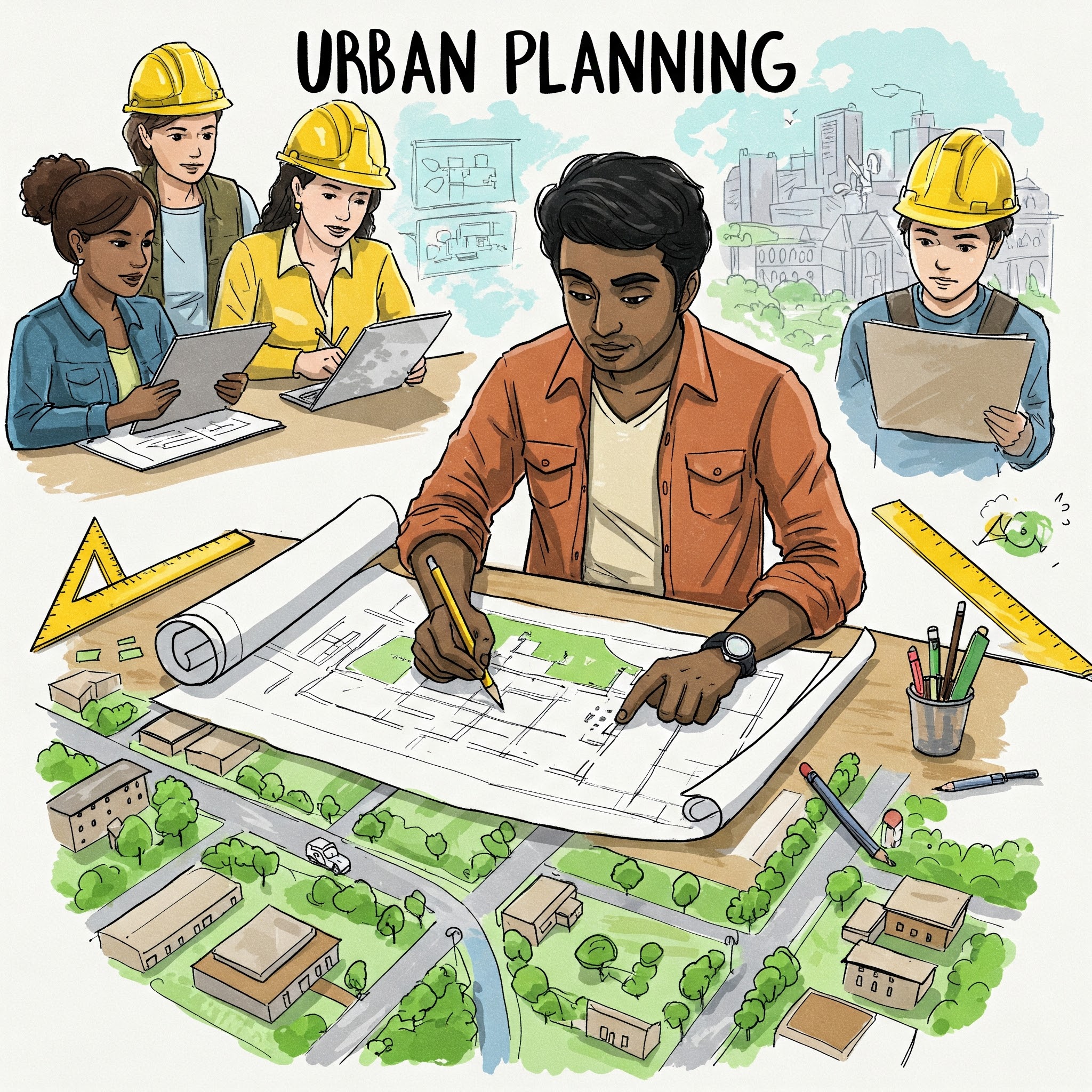Planning
Definition
Planning is the process of organizing, preparing, and determining actions to achieve specific goals or objectives.
Parts of Speech
- Noun
- Verb (present participle of "plan")
Pronunciation
American English
- IPA Pronunciation: /ˈplæn.ɪŋ/
- Respelling: PLAN-ing
British English
- IPA Pronunciation: /ˈplæn.ɪŋ/
- Respelling: PLAN-ing
Etymology
The word "planning" originates from the verb "plan," which comes from the Old French "plan," meaning "a drawing" or "map." Its use expanded in English to describe organizing actions or strategies. The suffix "-ing" denotes the process or activity of planning.
Derivatives
- Planner (noun)
- Preplanning (noun)
- Post-planning (noun)
- Overplanning (noun/verb)
- Planless (adjective)
Synonyms
- Organizing
- Strategizing
- Preparation
Antonyms
- Improvising
- Neglect
- Disorganization
Usage
The term "planning" is used to describe structured efforts to achieve desired outcomes. Examples include "Urban planning is crucial for sustainable development" (noun) and "She is planning her vacation carefully" (verb).
Related Terms
- Plan: A detailed proposal for achieving a goal.
- Strategy: A high-level method or approach to achieve objectives.
- Coordination: The process of organizing activities to ensure efficiency.
Detailed Definitions
Noun
- The process of organizing and preparing: Refers to the deliberate effort of determining goals and the steps needed to reach them.
- Example: "Effective planning helps ensure project success."
- The act of creating strategies: Refers to formulating methods or approaches for accomplishing specific tasks.
- Example: "Financial planning is vital for retirement."
- A field of study or profession: Refers to disciplines like urban or strategic planning.
- Example: "He works in city planning."
Verb
- To create a plan: Refers to the act of organizing or designing steps to achieve a goal.
- Example: "She is planning her wedding with great care."
planning



🇨🇳 Mandarin
- 计划 (jìhuà) - planning
- IPA: /t͡ɕi˥˩ xwa˨˩˦/
- Respelling: ji-hua
- 城市规划 (chéngshì guīhuà) - urban planning
- IPA: /ʈʂʰəŋ˧˥ ʂʐ̩˨˩˦ kweɪ˥˩ xwa˨˩˦/
- Respelling: cheng-shi gui-hua
🇮🇳 Hindi
- योजना (yojanā) - planning
- IPA: /joːd͡ʒnaː/
- Respelling: yo-jna
- शहरी नियोजन (śahrī niyojan) - urban planning
- IPA: /ʃəɦriː niːjoːd͡ʒn̪/
- Respelling: sha-hri ni-yo-jan
🇪🇸 Spanish
- Planificación - planning
- IPA: /planiɸikaˈθjon/
- Respelling: pla-ni-fi-ca-tion
- Planificación urbana - urban planning
- IPA: /planiɸikaˈθjon urˈβana/
- Respelling: pla-ni-fi-ca-tion ur-ba-na
🇫🇷 French
- Planification - planning
- IPA: /planifikasjɔ̃/
- Respelling: pla-ni-fi-ca-tion
- Urbanisme - urban planning
- IPA: /ybɑ̃nism/
- Respelling: ur-ba-nism
🇸🇦 Modern Standard Arabic
- التخطيط (al-takhteet) - planning
- IPA: /æl tæx'tiːtʕ/
- Respelling: al-takh-teet
- التخطيط العمراني (al-takhteet al-'umrani) - urban planning
- IPA: /æl tæx'tiːtʕ æl ʕumˈræːniː/
- Respelling: al-takh-teet al-'um-ra-ni
🇧🇩 Bengali
- পরিকল্পনা (porikalpanā) - planning
- IPA: /porikalpɔna/
- Respelling: po-ri-kal-po-na
- শহরগঠন পরিকল্পনা (shahorgothon porikalpanā) - urban planning
- IPA: /ʃɔhorɡɔʈon porikalpɔna/
- Respelling: sho-hor-goth-on po-ri-kal-po-na
🇷🇺 Russian
- Планирование (planírovanie) - planning
- IPA: /plənʲɪˈroʊvənʲɪɪ/
- Respelling: pla-ni-ro-van-ye
- Градостроительство (gradostroítel'stvo) - urban planning
- IPA: /ɡrədɐstrɐˈiːtʲɪlʲstvə/
- Respelling: gra-do-stroi-tel'st-vo
🇵🇹 Portuguese
- Planejamento - planning
- IPA: /plɐneʒɐˈmẽtu/
- Respelling: pla-ne-zha-men-to
- Planejamento urbano - urban planning
- IPA: /plɐneʒɐˈmẽtu urˈbɐnu/
- Respelling: pla-ne-zha-men-to ur-ba-nu
🇮🇩 Indonesian
- Perencanaan - planning
- IPA: /pərɛnʧaːnaːn/
- Respelling: pe-ren-cha-nan
- Perencanaan kota - urban planning
- IPA: /pərɛnʧaːnaːn koːta/
- Respelling: pe-ren-cha-nan ko-ta
🇩🇪 German
- Planung - planning
- IPA: /ˈplaːnʊŋ/
- Respelling: pla-nung
- Stadtplanung - urban planning
- IPA: /ʃtatˈplaːnʊŋ/
- Respelling: shtat-pla-nung
🇯🇵 Japanese
- 計画 (keikaku) - planning
- IPA: /keːkakɯ/
- Respelling: kei-ka-ku
- 都市計画 (toshikeikaku) - urban planning
- IPA: /toɕikeːkakɯ/
- Respelling: to-shi-kei-ka-ku
🇻🇳 Vietnamese
- Kế hoạch - planning
- IPA: /kɛ˨˩ hwək˨˩ˀ/
- Respelling: ke hwa
- Quy hoạch đô thị - urban planning
- IPA: /kwi hwək˨˩ˀ ðɔ˧ˀ tʰi˧˧/
- Respelling: kwi hwa do thi
🇰🇷 Korean
- 계획 (gyehoek) - planning
- IPA: /kjʰeːhʌk̚/
- Respelling: kye-heok
- 도시 계획 (dosi gyehoek) - urban planning
- IPA: /doʃi kjʰeːhʌk̚/
- Respelling: do-shi kye-heok
🇹🇷 Turkish
- Planlama - planning
- IPA: /plɑːnlɑmɑ/
- Respelling: plan-la-ma
- Kentsel planlama - urban planning
- IPA: /kentˈsel plɑːnˈlɑːmɑ/
- Respelling: kent-sel plan-la-ma
🇵🇰 Urdu
- منصوبہ بندی (mansūba bandī) - planning
- IPA: /mʊnˈsuːbə bændiː/
- Respelling: mun-su-ba ban-di
- شہری منصوبہ بندی (shahrī mansūba bandī) - urban planning
- IPA: /ʃəɦriː mʊnˈsuːbə bændiː/
- Respelling: sha-hri mun-su-ba ban-di





